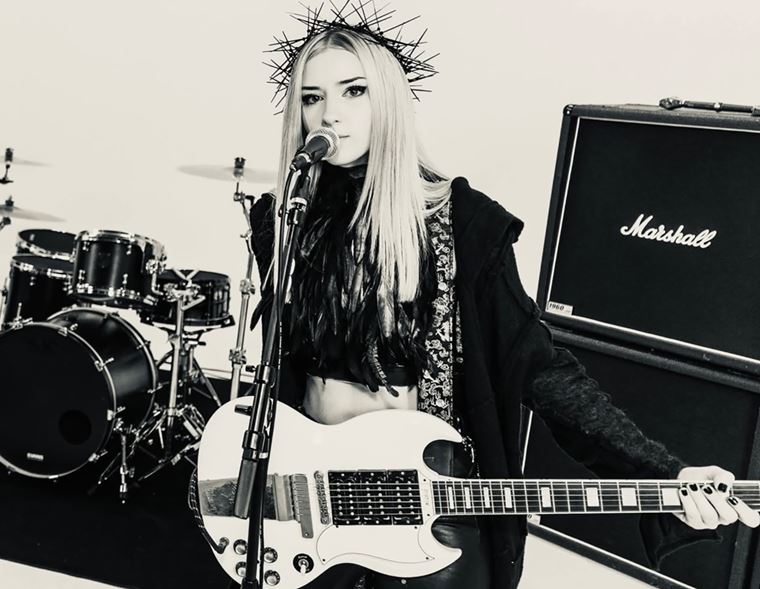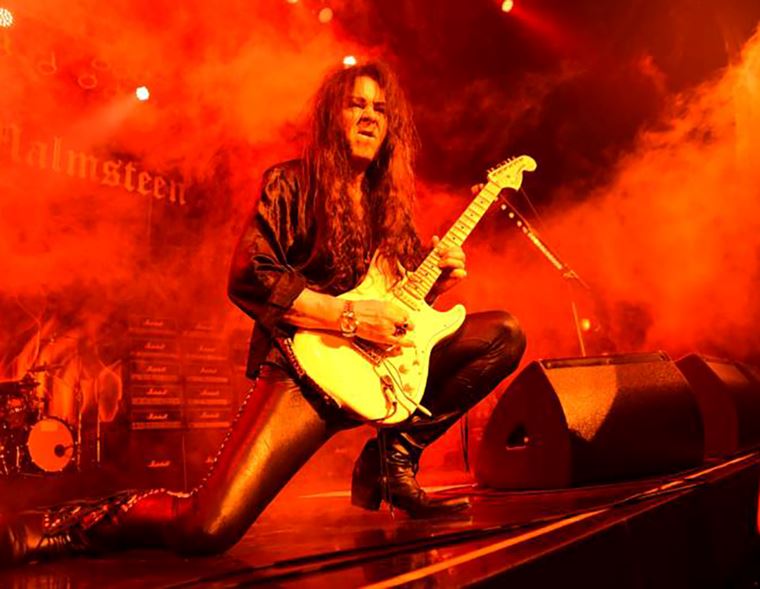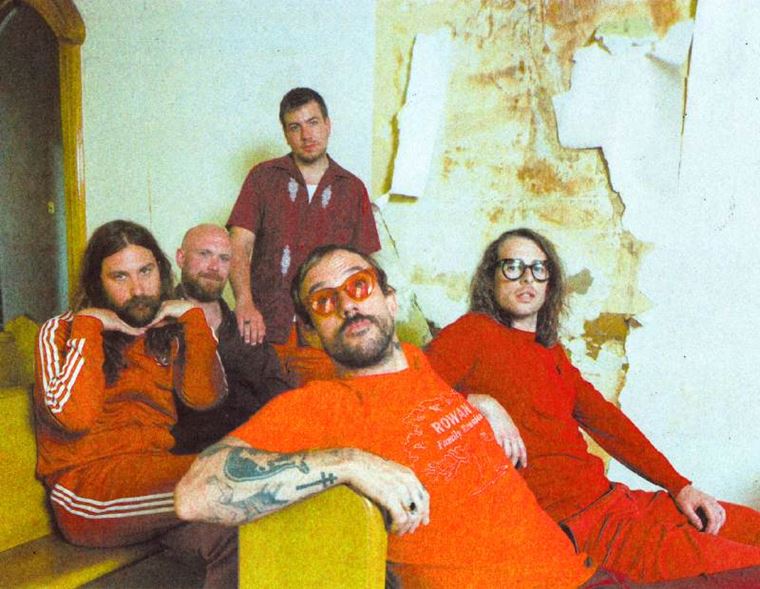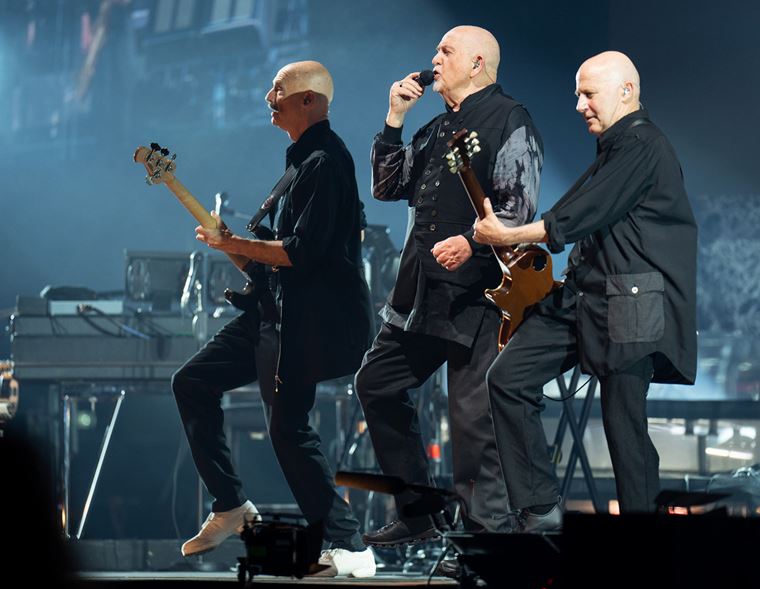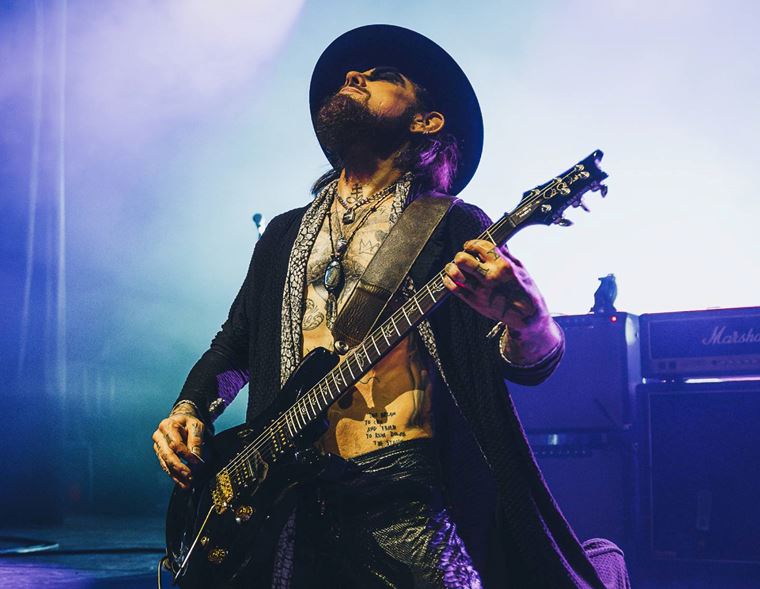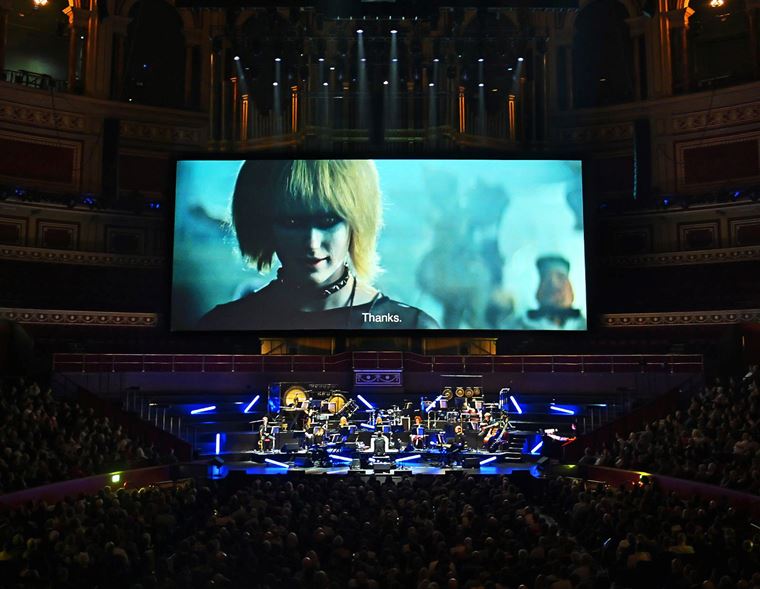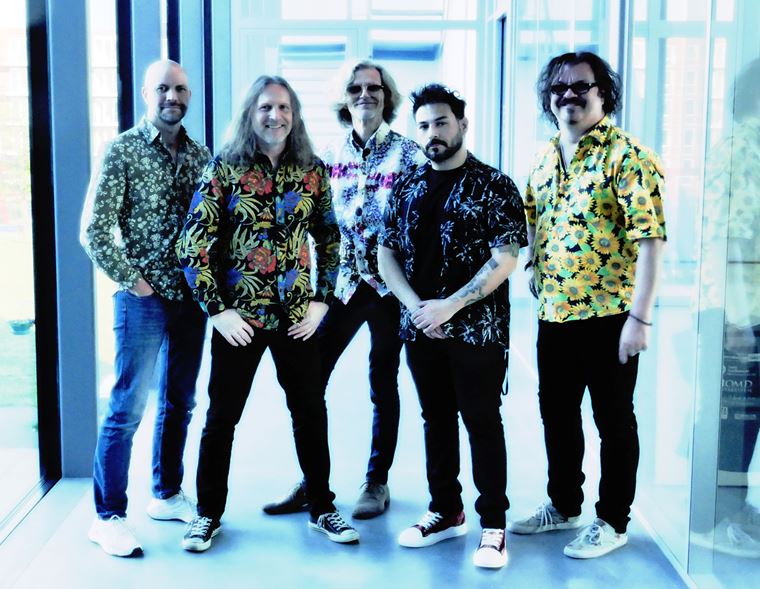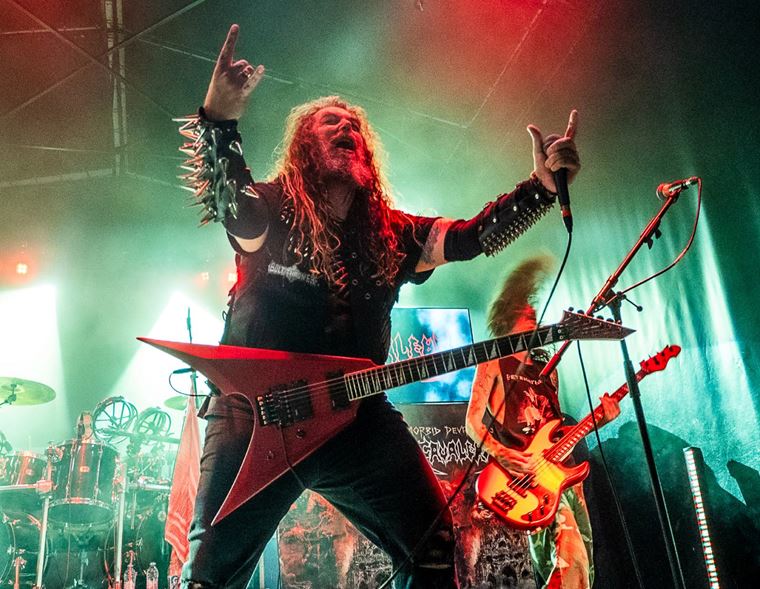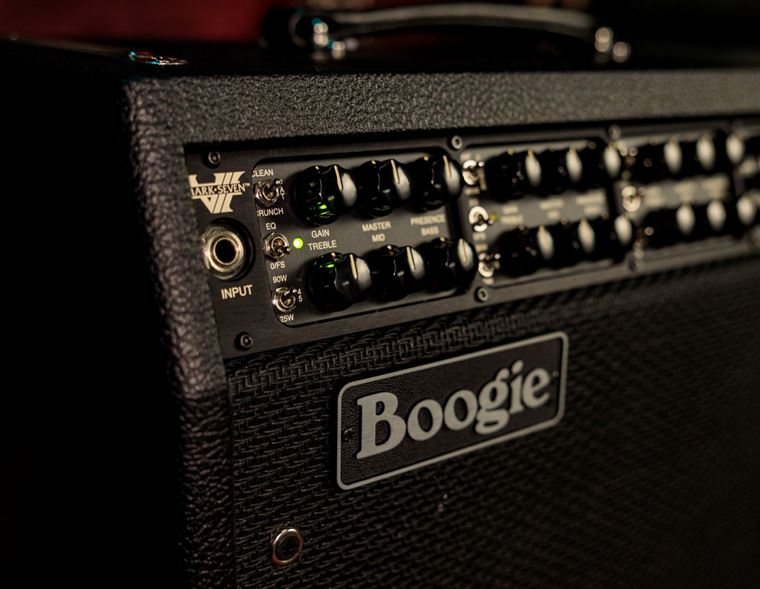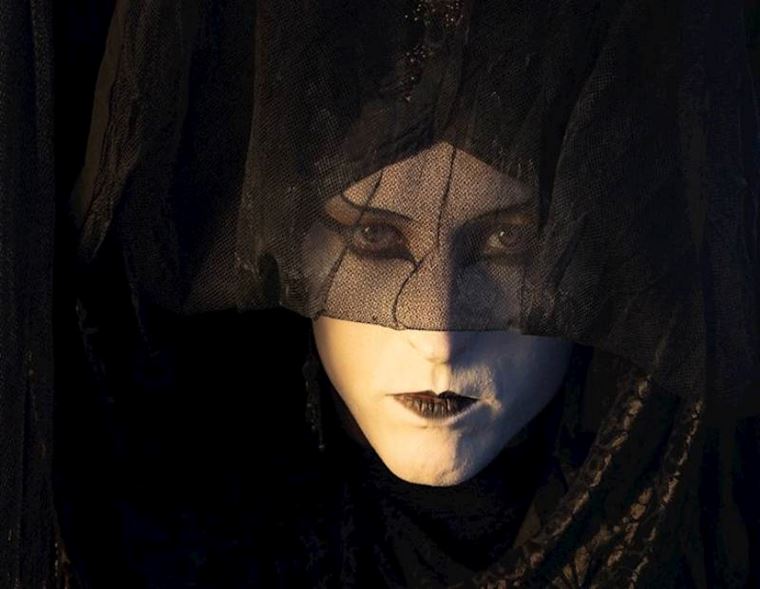"Technology is a scary thing but I think musicians get the nice end of it" OZRIC TENTACLES' Ed Wynne Speaks to Guitarguitar!
Published on 13 October 2023
You often hear descriptions of music 'taking you on a journey', but with Ozric Tentacles, the phrase is more than appropriate. Coming out of the early 80s Stonehenge New Age scene, Ozric Tentacles are a band who are simultaneously distinctive and impossible to classify. Blending together elements of prog, space rock, ambient music, dub, techno and world music, this adventurous sound has brought leader Ed Wynne and his cohorts on a 40-plus year journey of exploration and bliss.
The end of this month sees the Ozrics return with a new album, Lotus Unfolding, and a tour that takes them well into next year. Ed was on hand to discuss everything from uplifting music to Ibanez JEMs, six-armed drummers and a counterculture that is alive and well today. Read on for the full interview!
Ed Wynne Interview
Guitarguitar: This new record, the Lotus Unfolding, is great! I suppose the first thing that strikes me whenever I listen to an Ozric Tentacles album is the kaleidoscope of sounds, it’s such a rich palette. What a great end result, but how does that begin? What is the process of beginning a track for you?
Ed Wynne: Well, there are various ways that it happens, but the funny thing is, for the most part, it’s when I wake up in the morning and go into the studio. I switch it on, see if it’s working, then come through and suddenly some tune comes out, with the empty mind of the morning. Nine times out of ten, it’s worth hanging on to, so I begin scrabbling away, trying to get a recording going, to get some version of it down.
It’s not very often with guitar - sometimes it is - but it’s wherever it comes from, really.
GG: Yeah, so have you got kinda like a bank of synth presets that are your go-to sounds to get started with?
EW: Yeah, the main synth that I use, the first thing it does when I switch it on is this really nice little bell-like sparkly ethereal piano sound, it’s really quite a nice way to start off! It all depends, really. Sometimes I go in there for a guitar practice, which is not very often, but I can start off the synth making its own sound, and play along nice and gentle, ending up an hour later screaming away into a crescendo. Nobody hears it and it sounds great, it comes and goes.
GG: That’s actually quite a good idea for practising! So, you’d set up a chord progression or something and just play over it?
EW: Yeah, pretty much. Normally just one chord, slowly cycling through the different aspects of itself, a nice sound on the synth with octaves, slowly bringing the sound in and out.
GG: Nice! And then is it a process of feeling it out for the different layers you then add? There are obviously rhythmic elements, synth elements…is it like ‘I feel like I want this type of sound’ and then just going looking for it?
EW: In a way - and it sounds weird - but the track sort of suggests things to me. I can hear possible things to go on, so if it’s a good one, I’ll just race in there and try to get it down the best I can. It’s almost like the track tells me what it needs to have on it in order to survive, sort of thing. It’s strange, I just sit there and it comes tumbling in form somewhere! (laughs)
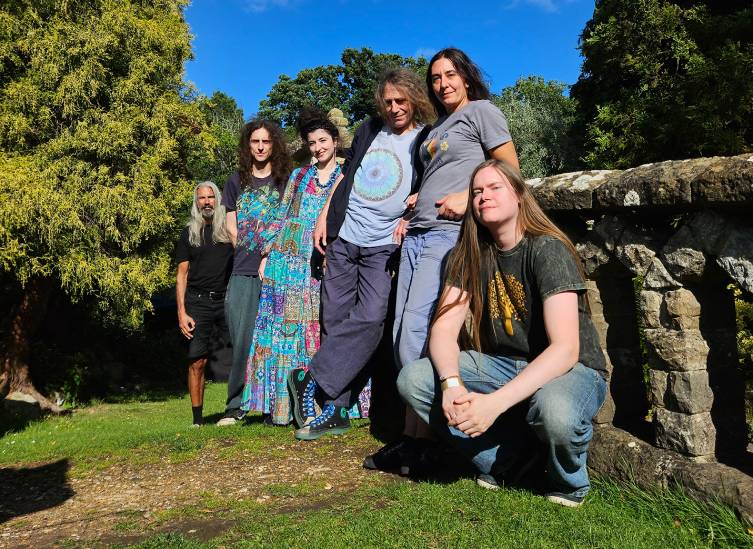
(Photo: Glenn Povey)
GG: Yeah, that makes a lot of sense! In that case, how about the arrangements? Quite a few Ozric are pretty long, like nine and ten minutes long. Do you go through a lot of different versions before you arrive at the one that gets released?
EW: No, very much not. No, I kind of build and write at the same time, just like building a sculpture or something, sort of add the bits. Yeah, there aren’t any other versions. I mix as I go, you know, and then at the end of the day there’s something hopefully presentable for the next morning, for the next load of stuff.
The way it often works is, at night I’ll do all the crazy throwing of mad stuff all over the thing, and in the morning I’ll wake up and try to sort it all out. ‘What happened the night before? Oh, all this! Let’s make that a little more sane’, and then on to the next one, you know?
GG: Yeah, totally! So, you’ve mentioned coming in of a morning and getting started, and you’ve also said you’re up late at night while the madness is happening. Does that mean that, of a given day, you’re in the studio the whole time?
EW: Pretty much! Pretty much, yeah. I spend a lot of time in there every single day. It’s kind of like, wake up and do that till I’m hungry (laughs) then make food and mess about again until I’m tired. It’s like a cycle.
"Happiness, blissfulness - it's something I strive very hard to do, and I find that it's much harder to do than to make aggressive, scary music"
I’m very fortunate to be able to do that: I’m very blessed that I can get away with doing my favourite thing in the world, and actually manage now - at long last - to be able to live off it. The universe is allowing me to do it, and it’s wonderful.
GG: What a gift! In terms of sounds, in addition to the guitars and synthesizers, there are also a lot of flutes. When I listen to the drums, also, it sounds to me like the drums are a performance rather than programmed. Are any elements of those sampled, or are they live performances?
EW: On this particular album, the flutes are actually real. Thankfully, Saskia, who is living here at the moment, she’s good enough to be able to do it, which is a rare treat for me. So, the flutes are all real on this one, which is not always the case.
The drums, well a lot of it is actually programmed.
GG: Really?
EW: Yeah, it’s one of my little things I do: to do ridiculous programmed drums. I make the imaginary six-armed drummer that I would like to have! (laughs) Three tracks on there are actually Tim, our drummer, but the rest of them is all my programming. It’s fun, I love it! I like making it slightly impossible.
GG: Yeah, it certainly sounds believable to me! I just wondered if it was an extraordinary drummer, when in fact it’s an impossible drummer!
EW: Yeah, the funny thing is, we recently in the last month acquired a new drummer, who I think can actually do this stuff! He’s the most incredible drummer I’ve ever heard, really, and thankfully he said yes, he’d love to jump in there and do the next load of gigs with us. I think I’ve finally found my drummer who can play what I program, at last! Can’t wait to find out!
GG: That’s great news! I’m looking forward to that too! So, with pretty much all of Ozric Tentacles’ music, there’s this expansive and yet very blissful sound. Is that part of the intention behind your music?
EW: It’s just what I need to do, really. It’s trying to evoke up-full pleasure; happiness; blissfulness. It’s something I strive very hard to do, and I find that it’s much harder to do than to make aggressive, scary music. It’s all very easy to go crazy, mental and intense, but I love it if I can get it so that it gives people a break from all of that chaos: give them a bit of a smile! (laughs) This is my intention, so thank you for noticing! I do try to go for the ‘up’ rather than the ‘down’ as much as I can.
GG: For sure, yeah! And with this new record, Lotus Unfolding, is there a particular theme that runs through it, or is it more like ‘this is what I’ve done recently’?
EW: It is basically a collection of what I’ve done recently, more so. It’s what I do all the time: I've got all these tracks, and when I get six or seven that are getting pretty close, I might look at them like they’d make a good little collection of tracks. It’s like a diary for me almost, of what I’ve done during the previous year. It’s almost like a sonic photo album, personally for me, because it evokes what was going on at the time and stuff.
So, the Lotus Unfolding idea, I dunno, it seemed like it was fairly blissful, this one, with that title track, for example. So yeah, it’s to do with unfolding into a nice day, like a lotus unfolding, and it’s a good one, a happy one. I’m a bit of a hippie when it comes to this! (laughs)
Gear Talk: Synths and Guitars
GG: It’s all good! Actually, that’s something I wouldn’t mind getting back to, that whole counterculture element, but we’ll get back to that! So, why don’t we talk about your studio set up then? Do you have a couple of go-to synths? I’m presuming hardware synths?
EW: I’ve got a couple of hardware synths. I tend to go for Novations synthesizers because they’ve got enough inside them. At the moment I’ve got a Novation Summit,next to me, their latest synth and the nicest sounding synth I’ve ever heard, actually. It’s a ridiculous thing! I have that and I have a Roland System 8 above it: I like it when they have loads of knobs all over them, because I can reach out and grab them.
And then not so many software synths, to be honest. I also have a little Behringer Pro-1, which is a little analog thing, a clone of what I used to have. It’s full of wires and is getting old and starting to fall to bits. This mini version is actually really good. I have all these synths set up, ready to go and I see what happens, really!
GG: Are you working on Pro Tools or Ableton or something?
EW: Yeah, Cubase is what I use actually. Many years ago I used to use analog stuff: a two-inch tape machine, which is alright except each reel of tape is quite heavy and you only get fifteen minutes on there, plus it costs a hundred quid! Nowadays, it’s on a tiny little thing.
I do work on the computerised way of it all: technology is a scary thing but I think that musicians get the nice end of it! We get all the toys, all the fun.
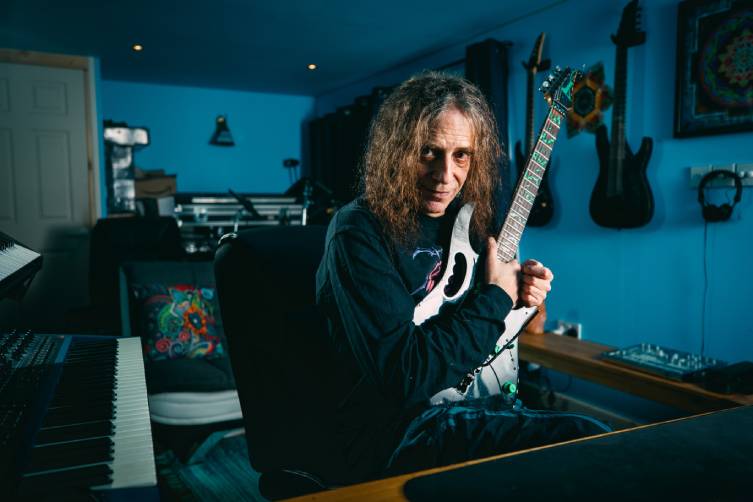
(Photo: Andrew Perry)
GG: That was actually something I wanted to touch on: because you’ve been making technology-based music since the 80s, I was thinking: tech has moved on in a lot of ways - even the ability to remake the Pro-1 as a tiny little thing haha - so where have you noticed technology helping you, and where has it gotten in the way? Have you encountered both?
ED: Well, I think the way it’s helped is it’s sped the whole thing up. Now, a very can be very quickly put in there, but it used to be that you had to find a reel of tape, switch on the machine, warm it up, get everything going, find a lead, plug it in…all those things. Now I can literally switch it on and go ‘do-do-do-do-do’ (mimes playing keys) as a little reminder and so the whole thing is speeded up and streamlined. All the annoying stuff is gone away now.
And it’s also lovely that the mix is sounding good the next morning. With analog, you have to really start from scratch each time you put it on, because there’s no memory of all that. So, it’s loads better, basically! And loads easier. People say that it doesn’t quite sound the same, but I don’t really compare: whatever, I don’t care about that.
GG: Yeah, how good does ‘good’ have to be at the end of the day, right?
EW: Yeah, exactly! And you asked what things are wrong with it? I think it’s made it very easy for the entire world to make a tune now, and you get a load of rubbish coming out now! I get a load of these people writing to me sometimes, saying ‘can you help me with my song? What do you think?’ and I can see it’s a bit done-by-numbers and crunched together, and I don’t know what to say, really.
GG: Mm, yeah.
EW: If I like a track, I can say something about it, but if I don’t, it’s very awkward! What they’re really saying is ‘Please could you tell me something nice about what I’ve just done?’ rather than criticism (laughs). I think the danger is it’s getting way too easy and you’re getting probably a few too many tunes nowadays.
GG: I know what you mean: it kind of dilutes the waters and makes it harder to hear good stuff because there’s so much noise.
"It's almost like the track tells me what it needs to have in order to survive"
EW: Yeah, that’s it exactly.
GG: Going back to the equipment, I’ve seen you with a lovely Ibanez JEM, so what are your guitar favourites?
EW: Well, that one for sure! And also, I’ve just recently had my favourite old guitar rebuilt after it fell to pieces. An Ibanez Artist, which is probably thirty-something years old. The jack plug fell out during a gig, the whole mechanism just came out when I trod on a lead. The whole thing was very sad but this guy suddenly said ‘Great, give it to me and I’m gonna mend it for you’. He’s just given it back and I went, ‘right, what do you want for that?’ and he said, ‘no charge’! Right, okay, thank you very much! So those are my two favourite guitars. Really.
GG: And the JEM is obviously associated with Steve Vai. Is that part of the reason why you went for that one?
EW: Actually, I went to Rose-Morris in London and the guy there, whom I knew vaguely, said ‘Right, right, you have to come over here and try this guitar!’ I tried it and really liked it, actually. I went out there staggering a little bit, thinking ‘what the hell was that?’ And actually what was really sweet was, I told my mum about it and the next morning she said, ‘Right: I’m gonna buy that for you!’ I was like, ‘What? You’re joking! Wow, really?’ So, she bought this JEM for me, and it’s still my absolute favourite guitar. I love it. My son Silas says that when he plays it, it feels like the strings are almost magnetised to the fretboard when you squeeze them. Something about the action on there is unique. It’s great: the power I have with that guitar is ridiculous! I can squeeze the tremolo fully all the way until the strings are hanging off like telephone wires and then ‘ding’, it’s back in tune again! It’s great, I love it.
GG: Nice!
EW: I do need to have a guitar that I can pull around the place. I’m able to do anything I want with that thing, and I do get a little carried away on stage!
GG: A great guitar to rely on! And on lots of Ozric records including this one, there sounds to me to be a lot of acoustic guitars too?
EW: Well, I traditionally use three hundred quid’s worth of not very expensive Yamaha electro, which is great. But thankfully, for this last album, somebody turned up at this gig with a new acoustic guitar for me that he’d built, which is really nice! He asked me, ‘what would you like?’, and I said Sandalwood because it smells nice, and he said, ‘Right! I’ll make it with Sandalwood’.
GG: Oh wow!
EW: And there’s a stone I really like called Malachite which is green. He said, ‘Okay, we’ll have a green ring around the soundhole made of Malachite’. It’s like, ‘Wow, really?’, you know? He appeared at this gig with the guitar and I’ve used it on quite a lot of this album. That’s exciting: that’s a lovely, hand-made guitar that he made for me.
GG: Yeah, and Sandalwood! I’ve never heard of that being used in guitar making before! Is it the entire instrument? Or just the top?
EW: It’s the back & sides, the top is something else, flamed maple or something. But it’s nice, it smells great! A scented guitar!
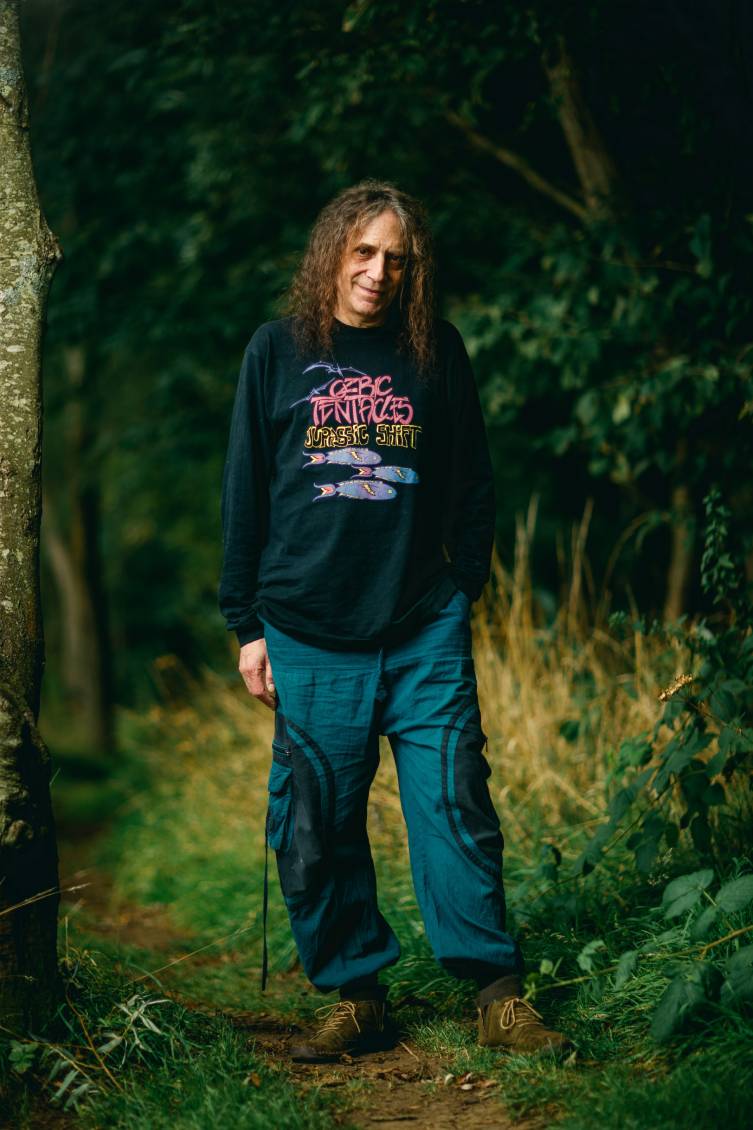
(Photo: Andrew Perry)
Playing Live
GG: I’m into that, that’s very unique! Ok, what about the live experience then? I caught your solo show a couple of years ago, but I’ve not seen Ozric Tentacles live. I suppose the question is: that rich tapestry of sound, how easy is that to recreate live, and what do you have to do to get it close enough for you to be happy?
EW: Well it’s much easier than it used to be! My son Silas takes care of the synthesizer and the backing track. I can actually take sound files off the computer and have them running live now, at last, which is great! I used to have to connect all my synthesizers with MIDI and have them all hopefully making sense and playing with each other as they should. Nowadays, it’s much easier.
So, Silas runs the backing track - not too much on there, just the key things - and a click going over to the drummer on a different channel. Also MIDI coming out of that so he can trigger synths as well. So he’s taking care of that, pushing a button when the track starts. That used to be my job, but now I’m thankfully free to not worry about that, which is lovely! I’ve done my time with that, so I can be a nutcase on the guitar instead.
GG: Cool! So do you not bother with keys at all when it’s live?
EW: Oh, I do! I still have my synth up there, because I do solos and I do all sorts. I’d feel a little lost with just the guitar! It’s good to have the two, and I started playing keyboard before the guitar, so that was natural to me to do that.
"The danger is it's getting way too easy and you're getting probably a few too many tunes nowadays"
GG: Yeah, that’s maybe your primary voice. And I’m thinking, there’s always that fear that the computers are going to crash or the synths won’t work at the gig: what’s your backup plan?
EW: Haha, yeah, you live by the box, you die by the box! It’s terrifying actually! My backup is that hopefully we can improvise. Our gigs used to be literally no tracks, we’d just go on and start, and see where we’d go so it’s very natural to be able to do that. If it does go down and needs to be rebooted or something, there are tracks we can play while that’s being done: older tracks, analog-ey tracks with sort of rock drums and stuff.
It’s a scary thing! Recently, I’ve stopped using my Marshall amp & pedals and I’ve actually got another unit now, the Neural DSP one? It’s just fantastic, it’s actually good enough that I can actually get rid of my amps and things. Sacrilege, but it’s a lot easier!
GG: Yep, yep! Is that the Quad Cortex?
EW: Yeah.
GG: It is sonically phenomenal. Do you have any particular amp models that you like to go to?
EW: I go to the closest I can get to my old Marshall amp, actually, which ended up being the Plexi one they’ve got in there. A great Marshall Plexi, which takes care of it. It’s just great, I’m astonished by it, actually.
And it means that you can go on stage and you don’t have to worry about the guy getting the mic in the wrong place. I used to have my 4x12 cab with the speakers in the corners, and it had this design on it that was like a target in the centre. The slightly less clever sound engineers put the mic in the middle, thinking that’s the speaker! (laughs) Oh man! So now, I just plug in and it’s great.
GG: And do you get all of your delays and effects from the Quad Cortex entirely?
EW: Yeah, all except for the wah pedal. I have my own one of them. It's instinctive for me to clonk that thing. But yeah, literally that is it.
GG: Nice! That’s a good way to do it! It also means that you know exactly how you’re going to sound every night in every venue, and you have total control over onstage volume, which is great, right?
EW: It’s really good, yeah. And we have the in-ear monitoring as well, which is quite bizarre. I love it, but if you’re waiting to go on stage and there’s another band in front of you, all you can hear is the drums now! It’s a different experience backstage now, it’s like a drum solo!
GG: Do you ever feel like there’s a slight disconnect because you’re not hearing some elements of what’s going on?
EW: I have a mic, so I can hear the people, with a fader on the little mixer. If it’s a bit clinical, I can turn that up and get a big room sound.
GG: Aaaah, that’s very clever!
EW: If people won’t shut up, you can turn them down and concentrate! (laughs)
GG: It’s good to be able to choose, haha! That’s great.
EW: The other thing I’ve noticed about live shows is that, without the amplifiers and stuff on stage, if an audience member comes up to the front of the stage, it gets quiet, because there’s nothing coming off the stage. I try to get someone to get the monitor wedges facing the other way, into the crowd in the middle, so they actually get to hear the band as well, now. That’s another little technique I’ve developed.
GG: Oh, you mean when the audience member comes up to the front of the stage, it’s quieter for them?
EW: Yeah, cause the PA is away over to the side. The wedges now are for the audience, not for us! (laughs)
GG: I never even thought of that! That’s ingenious.
EW: It’s a weird one, a very weird one!
Counterculture
GG: Amazing. Now, this next one is more about what your thoughts on it might be. You mentioned earlier how you’re a bit of a hippie in some contexts, and I’ve always associated Ozric Tentacles as a genuine counterculture band, starting independent, in the free party culture.
EW: Yep.
GG: That kind of culture, when I go looking for it today, I don’t even know where to begin looking, even though it’s out there somewhere. What happened to it and where is it just now?
EW: Well, it was ripe at one point, there was plenty going on. I think people…I don’t know what it is, it is funny because you can go to festivals and see it everywhere but a lot of them don’t actually get to the forefront. I don’t know why, maybe it’s not the right time. We were very fortunate with our timing, when we got slightly bigger than some. We were flavour of the month for a little bit, and so people were into it, what they called ‘Crustie’ at the time.
I’ve always had this philosophy of not wanting to be some guy going to work with a shaved back of the neck (laughs), mainly because that happened to me at school! But it’s hard to find that kind of music. There’s one called Henge. They’re slightly more contrived, they wear costumes and things, and talk about mystical stuff. It’s hard to say really, because I’m quite insular; I’m quite on my own here. I wake up and make my tunes, and then go to my gigs and there they all are, all the colourful people. It’s just nice, really. There’s not that many of us now there’s us and there’s Gong, who we play with, and not that many more, really.
"I love hearing things that I can't imagine to do"
GG: Yeah, it’s like at the festivals, these kinds of people will appear, but where do they go for the rest of the year? Do they go back to having the shaved back of the neck?
EW: Yeah, maybe! Some and some, for sure. I went to a festival recently, this Equinox festival, which was very much not so commercial. It was lovely, actually: very free and colourful, and there they all were, these people; smiling, hippy people. I don’t know where they go, kind of absorbed back into their worlds and then wait until next time, I don’t know.
GG: I wonder, part of my question was going to be whether (and how) it has changed from back in the day till now, 40 years later. So, from your perspective, how has that kind of counterculture changed?
EW: Well, from my point of view, not much really! We still go and do our gigs and the same kind of people turn up, but I think it’s slightly more far and few nowadays. I think it got refined at one point: it became kind of trendy to be like that for a while, or at least a refined version of that. Then you get the weekend hippies, who go to the festivals and then, as you said, take off their wigs (laughs) but I don’t know, it’s hard to say really. I find that there’s plenty of them still around. Enough to keep us happy, anyway.
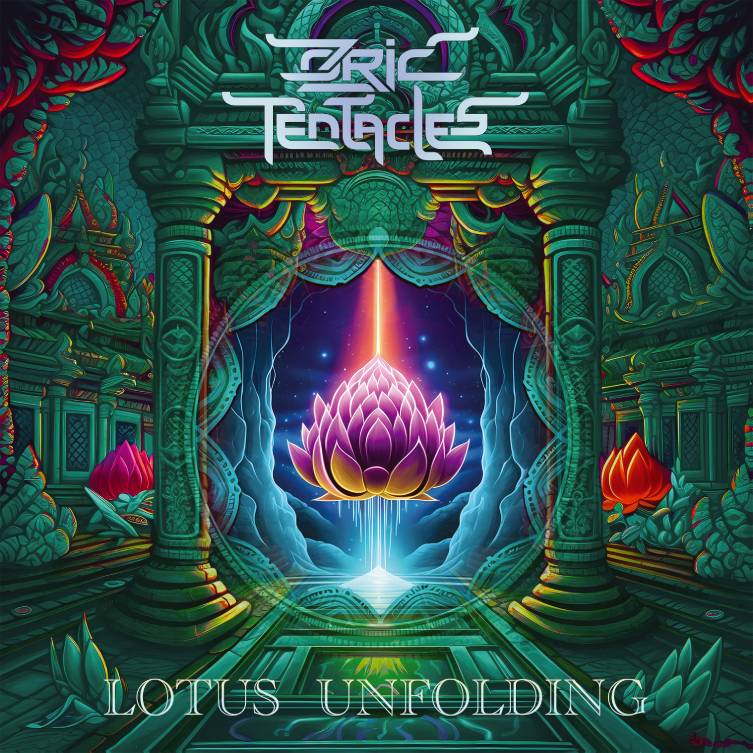
GG: Good! Excellent. Now finally, this is one of those ones that’s probably a bit of a pain in the ass to answer, but I figure it’s still valid. Given how eclectic sounding your music is, with elements of space rock, dub, ambient music, world music…asking you ‘what are your influences’ is such a cheap question, but…
EW: Sure, but they are fairly typical influences of mine, really. When I was quite young, Jimi Hendrix blew my mind, then those lot like Santana. I left school as soon as I possibly could, screaming to get out of there because I was busy, I had to play some music!
Then someone introduced me to the whole Gong family, and Steve Hillage, which made me totally change my whole world, actually. When I listened to that album of his called Green, I sat between the speakers and thought, ‘What is going on here?’ The fact that his guitar didn’t actually have to sound so much like a guitar but to allow it to be like a fizzy little bee buzzing around in the background, or whatever it had to be, you know? So yeah, all sorts, really.
And then things developed a bit, and guitarists suddenly changed to being the Steve Vai-style people who were doing this ridiculous tapping mechanism thing that I still can’t begin to do! It's not my world, that one. I wish I could, but I can’t! Then, more recently, it’s changed again. It’s become more refined, more scientific, almost. You get this math rock, Animals as Leaders and guitarists like that who are beyond what I can imagine. So I love hearing things that I can’t imagine to do. I’ve been playing guitar for god knows how long now - way too long, probably - and it sounds egotistical and I don’t mean it like this, but it’s hard to be impressed when you become quite prolific on the guitar; it’s quite hard to be amazed by people, so when I am, it’s a real pleasure. Like, these people are playing beyond my ability. I love it! I can’t get enough of it.
The new Ozric Tentacles record, Lotus Unfolding, is released on Oct 20th. Get it wherever you listen to music, and head over to the official Ozric Tentacles website for details on the extensive touring that’s going to be happening between now and next Spring!
We’d like to thank Ed for giving us his morning, and far sharing some great insights and stories. We’d also like to thank Simon Glackin for setting us up.
For over 150 exclusive interviews, head over to the guitarguitar Interviews page! We’ll see you next time!


